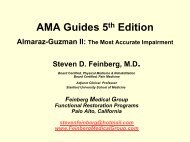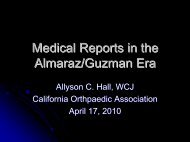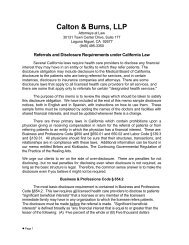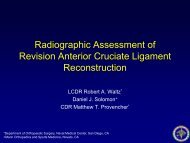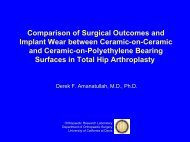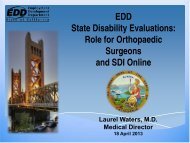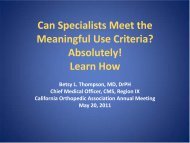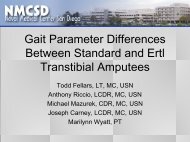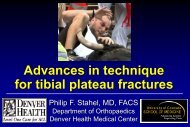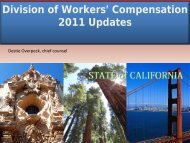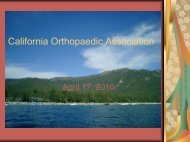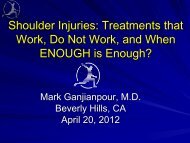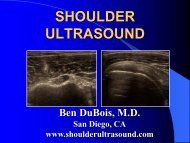Enhancing Your Practice's Revenue - California Orthopaedic ...
Enhancing Your Practice's Revenue - California Orthopaedic ...
Enhancing Your Practice's Revenue - California Orthopaedic ...
- No tags were found...
You also want an ePaper? Increase the reach of your titles
YUMPU automatically turns print PDFs into web optimized ePapers that Google loves.
Section 4Other IncomeChapter 10The Medical - Legal PracticeBy G. Klaud Miller, MDIntroductionThe word “forensic” is defined as “characteristic of, orsuitable for a court of law or public debate.” Because ofthe frequent involvement of orthopaedics in injuries,almost every orthopaedic surgeon has been involved inthe medical-legal arena at one time or another. Forensicmedicine is a broad term that includes such areas aspersonal injury, impairment (disability) evaluations,medical malpractice, expert witness, second opinions, feedisputes and independent medical examinations (IMEs).The AAOS feels that this is so important that it hasdedicated a portion of the website to the expert witnessprogram and has made an advisory statement outliningethical principles of orthopaedic medical testimony (seewww3.aaos.org/member/expwit/expertwitness.cfm).The “Bad and the Ugly” Part of “the Good,the Bad and the Ugly”Many surgeons by choice avoid contact with the legalprofession or case managers at all costs, realizing it is aworld with which they are not familiar. It is an area wherelawyers have written the rules and doctors must comply.Lawyers or case managers in turn have rules and deadlinesimposed upon them by the courts and administrativejudges. For example, if you are asked to serve as an expertwitness and cannot provide reports within establisheddeadlines and according to established rules, you will notsee any repeat requests.Reports must be impeccably unbiased & scientific. Opinionsmust be based only on literature (“evidence”), notpersonal views. It is not sufficient to justify opinions basedupon “That’s the way I’ve always done it.” Every reportyou write must be written as if you will be defending youropinions in court against an attorney, because this maywell happen. If opinions contained in a report cannot besubstantiated by scientific literature you will be (figurativelyspeaking of course) eviscerated.Attorneys are trained to take what opposing witnesses sayand turn the English language 180°. <strong>Your</strong> qualificationsand opinions will be routinely attacked. (“How long agodid you train?” “When was the last time you performedthe procedure under discussion (i.e., CPT code 12345)?”“How many of these procedures have you done?” “Areyou familiar with textbook ABC or a paper written by Dr.Jones?” And finally, a nearly universal question, “Howmuch money are you being paid for your testimony?”) Theopposing attorney may be condescending, argumentativeor hostile, and will almost certainly actively try to makeyou feel confused, frustrated and angry. Through it all,you must remain calm and answer questions objectively.Medical-legal testimony has been described as a “fullcontact sport.” It is important for you to leave your ego atthe door. An “I know because I’m the Doctor!” may play inPeoria, but not in front of a jury.If It’s So Bad, Why Should I Want to GetInvolved with This?In today’s challenging economic environment, forensicmedicine can be a significant financial addition. To a largeextent, it is independent of the government, insurancecompanies, and medical politics. In fact, in my opinion, thebiggest single factor in favor of such work is that you canlargely “control your own destiny.”The work is totally independent of insurance companyfee schedules or IPAs or HMOs. Morover, I also personallyenjoy the intellectual challenge of, “There but for the graceof God go I,” or “What is the literature concerning procedureor disease X?” Even if you feel that you are alreadycompletely familiar with the literature on a given topic, it isamazing how much you can learn from searching the literatureto make sure that you really are up-to-date. Think ofevery case as if you are preparing it for a grand rounds presentationin front of your professors. As stated above, youmust be able to substantiate your opinions with publishedliterature. I guarantee that you will learn something.In addition, there is the intangible benefit of “experience”in the legal system. The reality is that every orthopaedicsurgeon will be sued, perhaps several times, in the courseof an orthopaedic career. You will likely be called to testifyin your own defense. That is not the time to encounter thelegal system for the first time! In reviewing records, you willalso see how other orthopaedic surgeons document. Overthe years, I have incorporated multiple forms and proceduresthat I have encountered during my reviews. Finally,while there are deadlines, for the most part, you can do thiswork at night or on weekends. You don’t have to adhere toan office schedule or deal with appointment cancellations.© 2011 American Academy of <strong>Orthopaedic</strong> Surgeons35



